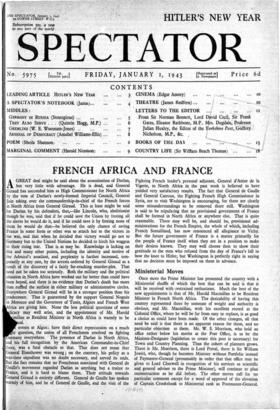FRENCH AFRICA AND FRANCE
AGREAT deal might be said about the assassination of Darlan, but very little with advantage. He is dead, and General Giraud has succeeded him as High Commissioner for North Africa by .the vote of Darlan's newly-formed Imperial Council, General Juin taking over the commandership-in-chief of the French forces in North Africa from General Giraud. This at least might be said for Darlan by his defenders, that,—like Lincoln, who, abolitionist though he was, said that if he could save the Union by freeing all the slaves he would. do it, and if he could save it by freeing none of them he would do that—he believed the only chance of saving France in some form or other was to attach her to the victors in the war, and that when he decided that victory would go not to Germany but to the United Nations he decided to hitch his waggon to their rising star. That is as may be. Knowledge is lacking on this and many other points, including the identity and motive of the Admiral's assailant, and perplexity is further increased, temporarily at any rate, by the arrests ordered by General Giraud as a result of the discovery of a fairly far-reaching murder-plot. That need not be -taken too seriously. Both the military and the political situation in North Africa have worked out far better than could have been hoped, and there is no evidence that Darlan's death has more than ruffled the surface in either military or administrative circles. Everywhere General Giraud will be in a stronger position than his predecessor. That is guaranteed by the support General Nogues in Morocco and the Governors of Tunis, Algiers and French West
rica are giving him. None the less political questions of some licacy may well arise, and the appointment of Mr. Harold millan as Resident Minister in North Africa is warmly to be
events at Algiet have their direct repercussion on a much er question, the union of all Frenchmen resolved on fighting ermany everywhere. The presence of Darlan in North Africa, and his full recognition by the American Commander-in-Chief there, was a fatal obstacle to that. That does not mean that General Eisenhower was wrong ; on the contrary, his policy as a war-time expedient was no doubt necessary, and served its ends. ut the fact remains that no Frenchman associated with General de Gaulle's movement regarded Darlan as anything but a traitor to France, and it is hard to blame them. Their attitude towards (-ieneral Giraud is entirely different. General de Gaulle has spoken varmly of him, and he of General de Gaulle, and the visit of the
Fighting French leader's personal adjutant, General d'Astier de la Vigerie, to North Africa in the past week is believed to have yielded very satisfactory results. The fact that General de Gaulle and General Catroux, the Fighting French High Commissioner in Syria, are to visit Washington is encouraging, for there are clearly some misunderstandings to be removed there still. Washington is said to be stipulating that no provisional government of France shall be formed in North Africa or anywhere else. That is quite reasonable. There may well be, and should be, provisional administrations for the French Empire, the whole of which, including French Somaliland, has now renounced all allegiance to Vichy. But the future government of France is a matter primarily for the people of France itself when they are in a position to make their desires known. They may well choose then to show their gratitude to the men who refused from the day of France's fall to bow the knee to Hitler, but Washington is perfectly right in saying that no decision must be imposed on them in advance.






















